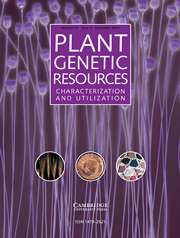Article contents
Exploring the breeding potential of Iranian emmer wheats to increase durum wheat tolerance to drought
Published online by Cambridge University Press: 16 September 2021
Abstract
Emmer wheat (Triticum turgidum ssp. dicoccum) is one of the most promising gene sources for drought tolerance improvement of durum wheat (Triticum turgidum ssp. durum). Achieving desired results requires a conscious choice of crossing parents based on general and specific combining ability (GCA and SCA) and also understanding the genes action involved in controlling the desired traits. In this study a 12 × 12 full diallel cross was performed using four emmer and eight durum wheats. The 132 hybrid progenies along with their parental lines were field evaluated under water-stressed and non-stressed conditions. Based on the Griffing diallel analysis both GCA and SCA effects were highly significant for all measured traits under both water treatments indicating possibility of improvement for drought tolerance. In this respect, the amount of additive effect was higher than the non-additive suggesting the chance for genetic advancement through selection. Based on Hayman's graphical analyses under the two water conditions it was revealed that several grain yield component traits were under the control of partial dominance. In contrary, grain yield and most morphological traits showed either dominance or over-dominance gene action. Grain yield had a significant positive correlation with the number of kernels per spike, kernel diameter, grain weight per spike and harvest index. These traits also had greater share of additive effects, relatively high narrow-sense heritability and high Baker ratio suggesting effective indirect selection for grain yield. Most durum × emmer hybrids had grain yield and drought tolerance indices better than the parents indicating that Iranian emmer wheats have a great genetic potential for drought tolerance improvement of durum wheat.
Keywords
- Type
- Research Article
- Information
- Copyright
- Copyright © The Author(s), 2021. Published by Cambridge University Press on behalf of NIAB
References
- 3
- Cited by


